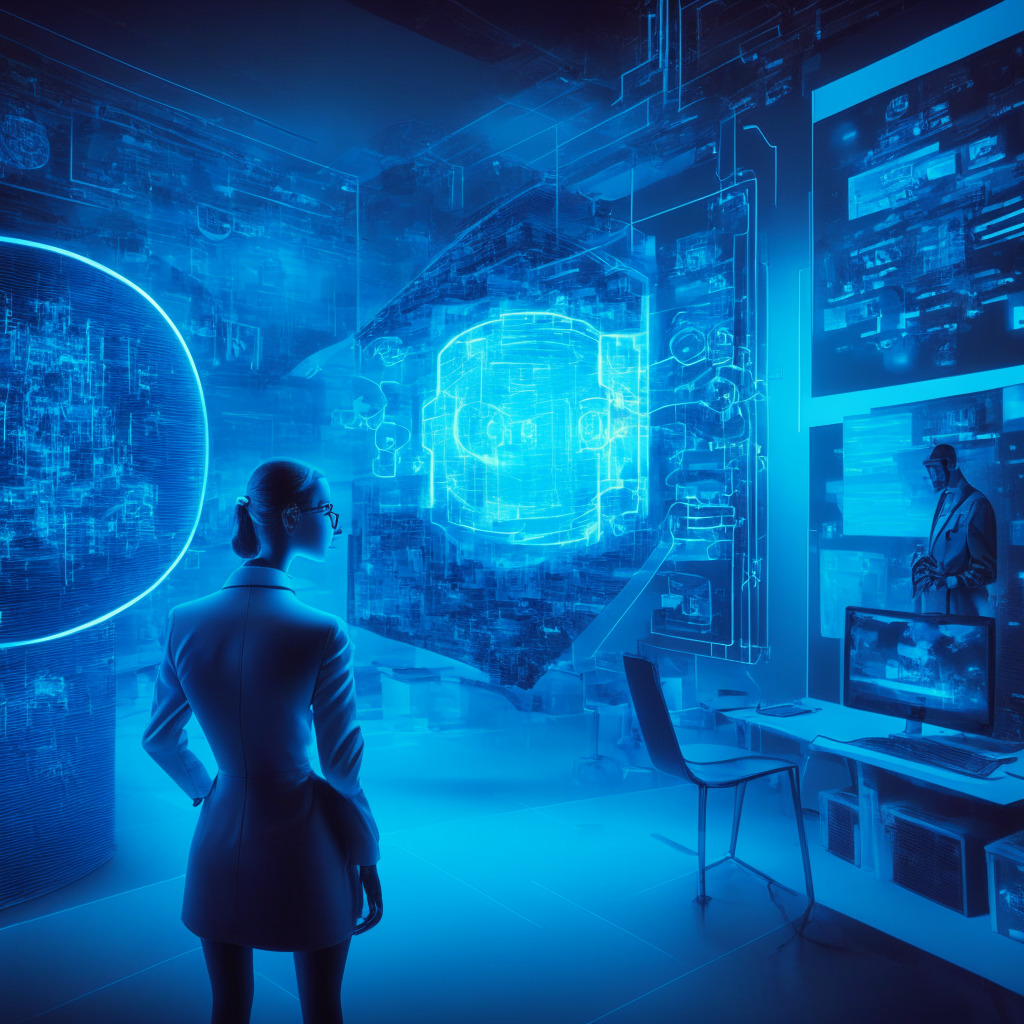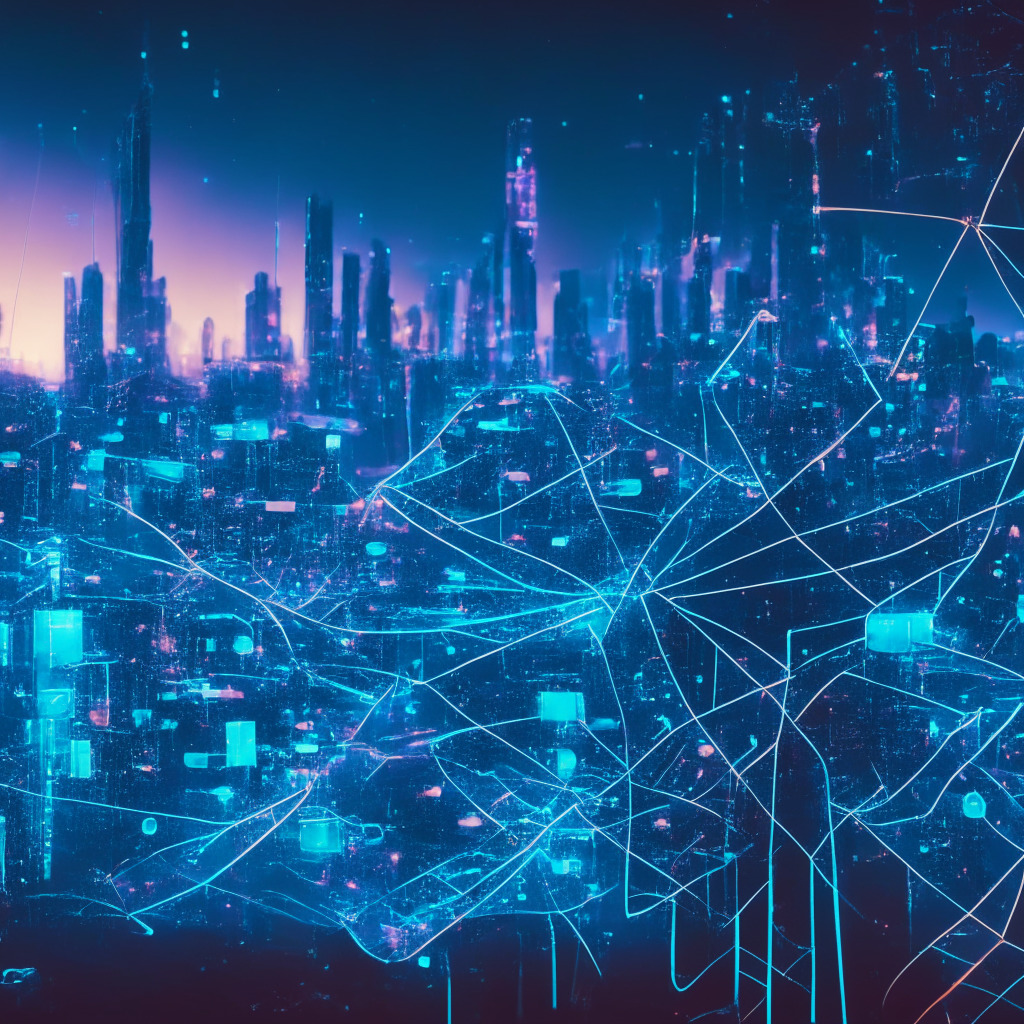The global AI market growth is seeing a significant surge, with 50%-60% of all organizations globally utilizing AI-powered tools. While AI assistants offer numerous benefits like ease of blockchain decoding and operation of smart contracts, there are potential drawbacks including security loopholes and job dilution. It’s essential its use is carefully regulated.
Search Results for: artificial intelligence
AI in Military and Beyond: Helsing’s Expansion and the Pervasive Role of Artificial Intelligence
AI startup Helisng, focused on developing AI-powered solutions for military use, has raised $223 million in Series B funding, led by General Catalyst and Saab. This funding is set to boost their goal of furthering AI technology for protecting democratic nations. Meanwhile, the proliferation of AI technology sparks discussions on job displacement and ethical issues surrounding its application, particularly in warfare.
AI and Financial Regulation: The SEC’s Quiet Embrace of Artificial Intelligence
The United States Securities and Exchange Commission (SEC) is employing artificial intelligence for financial surveillance, confirmed SEC Chair, Gary Gensler. This technology aids in identifying patterns of market manipulation or fraudulent activities. However, questions about privacy, potential bias, and the need for transparency in the use of such technologies by regulatory agencies persist.
Artificial Intelligence vs Human Touch: The Dilemma for Food Delivery Platforms
DoorDash is incorporating AI into its customer service system to enhance efficiency and meet higher demand. Unlike pure AI models, DoorDash’s system blends human and AI operators. Although it promises a more personalized experience, questions about AI mimicking human instincts and language adaptability persist.
Artificial Intelligence and Blockchain: Transforming Trading with the Rise of yPredict
“yPredict is an AI-led platform aiming to enhance cryptocurrency trading with cogent predictive signals. This innovative system uses AI to analyze and identify reliable trading patterns, employing natural language processing and sentiment analysis to provide traders with a comprehensive market overview. However, high risks in crypto trading warrant caution.”
Artificial Intelligence: A Double-Edged Sword for The Global Financial System
SEC Chair, Gary Gensler warns against big tech’s monopolization of AI applications in financial markets, voicing concerns about potential global economic destabilization. With AI’s integration into areas like robo-advisors and stock market prediction, Gensler believes failure to regulate could exacerbate economic instability due to financial system interconnectivity.
Navigating Artificial Intelligence: US Government’s Insightful Stance and Thrust for Legislation
“The US Government is planning its first classified AI briefing, focusing on AI utilization and investment. The briefing, organized by Democrats, intends to highlight AI’s role in national security. It emphasizes the need for comprehensive legislation to manage the potential consequences of AI development.”
Entering the AI Landscape: A Comprehensive Guide to Landing a Career in Artificial Intelligence
“A career in AI presents countless opportunities. To succeed, build foundational knowledge in core AI subjects, choose a speciality, create a strong portfolio showcasing your ability, gain practical experience, and stay updated with industry trends.”
AI Safety Legislation: Balancing Innovation and Public Trust in the Era of Artificial Intelligence
US Senate Majority Leader Chuck Schumer plans to call for comprehensive legislation regarding AI safety measures, emphasizing bipartisan action from Congress. Addressing safe innovation, privacy, biases, and misinformation, Schumer aims to ensure responsible and secure AI development while maintaining public trust in the technology.
EU AI Act: Balancing Innovation and Ethics in Artificial Intelligence Regulation
The European Parliament recently passed the EU AI Act, aiming to promote human-centric and trustworthy AI while protecting health, safety, and fundamental rights. The act restricts certain AI services and products, including biometric surveillance and predictive policing, while allowing generative AI models like OpenAI’s ChatGPT and Google’s Bard, provided they are clearly labeled. The challenge lies in balancing innovation and safety in AI development.
Navigating the Surge in AI: Evaluating Business Intelligence Platform AlphaSense
AlphaSense, an AI platform focused on business intelligence and search, has raised its valuation from $1.7 billion to $2.5 billion. The firm offers insights-as-a-service, delivering perceptive business and finance analytics, with its tailored approach promising more specific insights in the crypto and blockchain world. Despite the high-risk, high reward nature of the AI sector, AlphaSense plans to strategically position itself in the B2B generative AI sector.
ChatGPT Integration in Blockchain Intelligence: Revolution or Job Threat?
UK-based crypto analytics firm Elliptic is incorporating AI chatbot ChatGPT to enhance its team’s efficiency in tracking cybercriminals. This integration aims to improve the accuracy, scalability, and organization of intelligence on new risk factors, while also raising concerns about job automation.
Balancing AI Innovation and Control: OpenAI’s 3-Pillar Strategy for Superintelligence Governance
OpenAI CEO Sam Altman and team warn of AI systems progressing beyond expert skill levels, affecting the global corporate landscape, and emphasize the need for governance of superintelligence. They propose three-pillars: balancing control and innovation, creating an international AI governance authority, and maintaining technical capability to control superintelligence.
OpenAI’s Crossroad: In-House Chip Production versus Outsourcing amidst Global Shortage
Amid a global chip shortage, artificial intelligence firm OpenAI debates on whether to bring chip production in-house or continue working with chip suppliers like NVIDIA. This decision could present unprecedented challenges, but may also provide a pathway for managing technological advancements and supply scarcity in the broader tech industry.
AI vs Human Authored Content: Google’s Policy Shift Raises Questions on Web Knowledge Reliability
“In a significant policy shift, Google now accepts content generated by artificial intelligence (AI). This change brings several issues to light: defining quality content, distinguishing between human and AI-written work, and the reliability of AI-produced content. This shift may escalate unchecked and unsourced information on the internet.”
Unveiling France’s AI Ambitions: Iliad’s $106m Investment and the Future of European AI
French telecom firm Iliad is investing around $106 million USD in the local artificial intelligence (AI) sector, creating a laboratory for cutting-edge AI research in Paris. The lab will design general AI while possibly making use of Europe’s ‘most powerful cloud-native Ai supercomputer’ created by NVIDIA.
Balancing Potential and Threats: Unpacking Amazon’s Big Bet on AI Startup Anthropic
Amazon’s $4 billion investment in AI start-up Anthropic could enhance the world of artificial intelligence and open up new possibilities. However, concerns about lack of clear governance and Amazon’s increasing control over AI advancements spark worry amidst this technological progression.
Decentralization of AI: Inhibition by Regulation vs Growth through Open-Sourcing
“Brian Armstrong, CEO of Coinbase, is advocating for a ‘laissez-faire’ approach to artificial intelligence (AI) development, opposing AI regulation as it stifles innovation. He suggests decentralization and open sourcing as alternatives. Despite potential risks, Armstrong believes in fostering growth and rapid development in the AI field.”
AI Revolution or New Tech Bubble? Goldman Sachs Predicts Major Investment Shift towards AI
Goldman Sachs views the boom of Artificial Intelligence (AI) as not a bubble, but the beginning of an AI revolution. The firm predicts global AI investments to reach $200 billion by 2025, attributing this expected surge to the expansive economic opportunities offered by generative AI. Despite this optimism, cautious investment approach has been advised.
KBank’s $100 Million Fund: A Leap into the AI, Web3, and Global Fintech Future or Risky Business?
Thailand’s Kasikornbank (KBank) has launched a $100 million fund targeting Artificial Intelligence (AI), Web3, and global fintech startups. With backing from the Bank of Thailand, the fund aims to drive global innovators to advance finance in the APAC region.
When AI Meets Blockchain: Exploring the Emergence of AI Cryptos like SingularityNET, Ocean Protocol, and yPredict
“Artificial intelligence (AI) and cryptocurrencies come together in AI crypto tokens, fueling AI platforms supported by blockchain. Examples include SingularityNET’s AI marketplace, Ocean Protocol’s data trading service, and yPredict’s AI-driven crypto analysis ecosystem. These AI crypto projects represent the innovative intersection of two revolutionary technologies.”
SEC Approval for Nasdaq’s AI-driven Trading: A Leap or a Stumble?
“Nasdaq receives unprecedented SEC approval to use artificial intelligence for trade execution. This real-time reinforcement learning AI-driven order system, distinct from traditional automation, recalibrates in response to market conditions, potentially speeding up trading. However, concerns about integrity and regulatory hurdles persist.”
AI Influence on Social Media: A Threat to Democratic Elections or an Essential Tool for Hazard Detection?
“Artificial Intelligence (AI) applications may manipulate voter sentiment in the 2024 U.S elections, posing threats to democratic processes. Despite being a potential tool for propaganda, AI is also being employed to detect and counter disinformation threats on social media.”
New Wave of AI-driven Crypto Projects: Revolutionary Benefits and Possible Pitfalls
Blockchain and Artificial Intelligence (AI) are promising innovations with the potential to reshape our future. AI in particular is a game-changer in the crypto world, enabling informed investing through machine learning and predictive analytics. Five emerging AI crypto coin projects – Launchpad XYZ, Fetch.ai, PAAL AI, Unibot, and yPredict – are revolutionizing everything from decentralized trading platforms to predictive analytics tools.
Navigating the Crypto Trading Landscape: A Deep Dive into yPredict’s Future Offerings
“yPredict aims to blend artificial intelligence with financial acumen to address challenges in cryptocurrency trading. With offerings such as data-driven insights, token analysis, and predictive models due between 2023 and 2024, this platform promises to bring a more precise prediction model for asset price forecasting in the crypto market.”
Gleen’s Chatbot Success & Future Prospects: Showcasing a Vision to Redefine AI Communication
Gleen, a California-based chatbot service, raised $4.9 million in funding, attracting investors from both traditional software and crypto sectors. The firm focuses on blockchain infrastructure channels on Discord, with a proprietary machine-learning layer combating the issue of ‘hallucination’ in artificial intelligence systems and providing accurate data storage and retrieval.
AI-Powered Scams: The New Era of Cyber Threats Plaguing the Crypto World
“Artificial intelligence (AI) is driving increasingly sophisticated digital scams threatening cryptocurrency organizations, warns Richard Ma, co-founder of Web3 security firm, Quantstamp. By mimicking corporate functions and engaging in credible dialogues, AI aids in successfully executing large-scale scams, particularly posing a high risk for the crypto sectors. Constant vigilance and secure internal communication platforms are key for cybersecurity.”
Harnessing the Power: The Intersection of AI and Cryptocurrency in Cronos Labs’ $100M Program
“Cronos Labs is looking for eight innovative crypto startups to join their $100 million accelerator program, aiming to marry artificial intelligence (AI) with crypto. Blockchain developers are leveraging the growing interest in AI to accelerate the growth of the digital economy, projecting AI and cryptocurrency as the next critical turning point.”
Navigating the AI Wave in Crypto Trading: The Rise of ChatBots and User Trust Issues
“Cryptocurrency exchange Bybit recently introduced ‘TradeGPT’, an artificial intelligence (AI) trading assistant that provides insights using platform market data. The tool utilizes both the ChatGPT language model and Bybit’s ToolsGPT for real-time market analysis and user Q&A assistance, intending to educate users in the complex crypto-sphere.”
Unmasking the Powerplay: The Convergence of Bitcoin and AI and the Surge of DeFi
“Cathie Wood, CEO of Ark Invest, and Changpeng “CZ” Zhao of Binance express optimism about the future of Artificial Intelligence (AI) and Bitcoin, and the potential of decentralized finance (DeFi). Despite high volatility, regulatory uncertainties and potential misuse of AI, Wood and Zhao see transformative potential and investment opportunities in these areas.”
Regulating AI: Struggling Copyright Laws in the Era of Generative AI Models
The U.S. Copyright Office seeks insight on copyright concerns related to Artificial Intelligence (AI), particularly the use of copyrighted works to train AI and issues around AI-generated content. Pressing issues include AI’s capacity to mimic human artists. Media and entertainment industries grapple with unauthorised use of copyrighted materials for AI training. This discourse on AI, copyright, and regulation intertwines ethics, transparency, and surveillance matters.
Nigeria’s Bold AI Leap: Contributing to Global Progress while Navigating Ethical Quandaries
“Nigeria is shaping its National Artificial Intelligence Strategy, seeking global experts to contribute their knowledge. AI, forecasted to contribute $15.7 trillion to the world economy by 2030, could transform Nigeria’s production, services, and economy. However, ethical considerations like data privacy, job displacement, and misuse exist alongside its transformative potential.”































